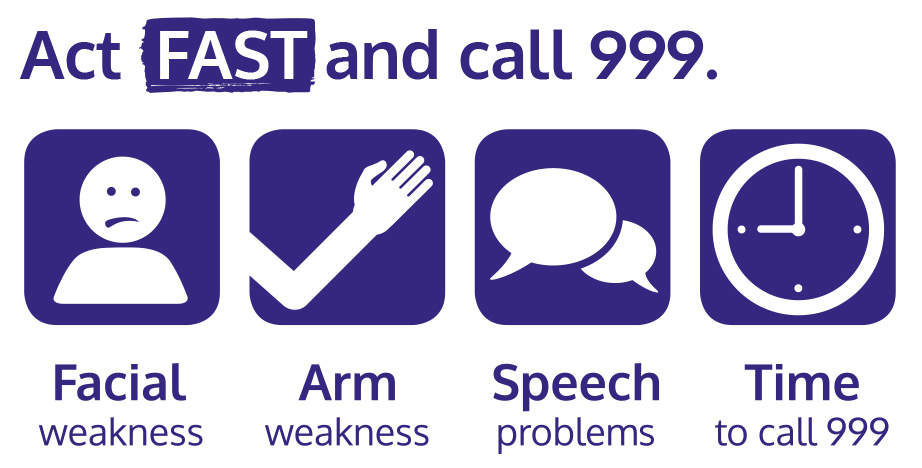Stroke strikes every five minutes in the UK. It can happen to anyone, of any age, at any time. It’s vital to know how to spot the signs of a stroke in yourself or someone else.
Stroke is a medical emergency. The FAST test can help you recognise the most common signs.
- Facial weakness: Can the person smile? Has their mouth or eye drooped?
- Arm weakness: Can the person raise both arms?
- Speech problems: Can the person speak clearly and understand what you say?
- Time to call 999: if you see any of these signs.

Make sure you and your loved ones all know the FAST test.
Ambulance paramedics are trained in stroke, and will ensure the person receives emergency medical care and specialist treatment.
Other symptoms of a stroke
The FAST test helps to spot the three most common symptoms of stroke. But there are other signs that you should always take seriously. These include:
- Sudden weakness or numbness on one side of the body, including legs, hands or feet.
- Difficulty finding words or speaking in clear sentences.
- Sudden blurred vision or loss of sight in one or both eyes.
- Sudden memory loss or confusion, and dizziness or a sudden fall.
- A sudden, severe headache.
If you spot any of these signs of a stroke, don’t wait. Call 999 straight away.
Different types of a stroke
There are three different types of stroke:
An ischaemic stroke is caused by a blockage cutting off the blood supply to the brain. This is the most common type of stroke.
A haemorrhagic stroke is caused by bleeding in or around the brain.
A transient ischaemic attack or TIA is also known as a mini-stroke. It is the same as a stroke, except that the symptoms only last for a short amount of time. This is because the blockage that stops the blood getting to your brain is temporary.
What causes stroke?
As we age, our arteries become harder and narrower and more likely to become blocked. However, certain medical conditions and lifestyle factors can speed up this process and increase your risk of having a stroke.
Can you recover from stroke?
All strokes are different. For some people the effects may be relatively minor and may not last long. Others may be left with more serious problems that make them dependent on other people.
Unfortunately, some strokes can be very serious and some may lead to coma or sudden death. That’s why it’s so important to be able to recognise the symptoms and get medical help as quickly as possible.
The quicker you receive treatment, the better your chances for a good recovery.
Information sourced by the Stroke Association
